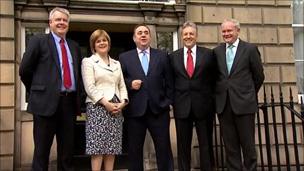Tax powers on the devolved agenda
- Published
- comments

The leaders of the devolved administrations were meeting in Edinburgh
Tricky diplomacy underlying the tripartite talks in Edinburgh today involving the first ministers of Scotland, Wales and Northern Ireland.
Extra tricky, perhaps, in that the objective for one party might be to rein in Scotland's FM to some extent.
Never easy - and particularly troublesome as the issue at stake is one where Alex Salmond believes powerful advocacy may be required to advance Scotland's interests.
The issue? Corporation tax. The rate levied on companies in the UK is progressively on its way down from 28p to 24p. By contrast, the rate in the Republic of Ireland is 12.5p.
Politicians in Northern Ireland want parity with their neighbours to the south in order to allow their economy to grow.
That has support across the communities in NI - and, crucially, has been backed by Owen Paterson, the Northern Ireland secretary in the UK government.
That proposal is out to consultation - with the process due to close towards the end of this month. Following that, the Treasury will rule.
But, says Alex Salmond, Scotland could use a low-tax incentive too. His argument was backed in the last parliament by a cross-party committee, chaired by Wendy Alexander, who said that the UK government should consider extending the deal to Scotland if it proceeds in Northern Ireland.
Now, naturally, the NI ministers at today's talks in Bute House will be too polite to put the matter bluntly to their host. All best wishes, they will say. Thanks for your hospitable welcome.
But, privately, they are thought to wish that Mr Salmond might tone down the rhetoric just a tad on corporation tax right now.
Their underlying fear is that the Treasury - always sceptical on conceding tax powers - might take fright altogether if Scotland demands immediate parity.
Perhaps, say those close to the NI scene, Scotland might care to let Northern Ireland take the lead now, pressing a case later. They argue, sotto voce, that Scotland will scarcely benefit if NI is turned down flat.
However, Mr Salmond might credibly argue that it is his role - his duty, indeed - to advance causes which, he believes, stand to benefit Scotland. It is fundamental to his strategy that further fiscal powers should be transferred to Scotland.
Here's a further thought. If corporation tax is cut in NI under devolved powers, then it is presumed that public spending would also have to be cut. Otherwise, it risks breaking European law on regional incentives. In other words, NI can offer a tax break - but must suffer pain to do so.